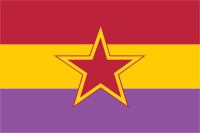- First of October Anti-Fascist Resistance Groups
-
First of October Anti-Fascist Resistance Groups 
Flag of the PCE(r) and the GRAPO, based on the Spanish Republic flagLeader Unknown Motives The creation of a Socialist republic state in Spain Active region(s) Spain Ideology Marxism-Leninism The First of October Anti-Fascist Resistance Groups (Spanish: Grupos de Resistencia Antifascista Primero de Octubre, GRAPO) is the armed wing of the Partido Comunista de España-reconstitutido (PCE-r), a Spanish clandestine Maoist group aiming for the formation of a Spanish Republican state, based on the model of Maoist China. Besides its anticapitalism, it is strongly opposed to Spain's NATO membership and its rhetoric is extremely anti-American.[citation needed]
To date, the latest violent action inflicted by GRAPO dates from 2006. After having been fairly active in the late 1970s and early 1980s, currently their dwindling numbers, lack of any social support and police action has allowed Spanish officials to claim a number of times to have disbanded the GRAPO after the few remaining militants of the band were captured. Currently,[when?] according to the Spanish police, GRAPO was disbanded after six of its militants were arrested in June 2007[1] but, formally, the group has not announced its dissolution.
GRAPO is included in the European Union list of terrorist persons and organisations.[2]
History
At the beginning of 1976, two months after Franco’s death, during the Spanish political transition from dictatorship to democracy, the PCE-r began a revolutionary struggle against the political reforms. The PCE(r) restructured itself into different commissions; one of these was a “front against fascism”, which became the GRAPO.
This newly-born movement was named after the first violent action of the PCE(r), namely the murder of four Spanish armed policemen on October 1, 1975. The "Antifascist Resistance Groups October First" (GRAPO) would soon become a terrorist organization. Only two months later, after five PCE(r) supporters were killed by the Spanish police during demonstrations in Vitoria, the PCE(r) inspired its sympathizers to take up arms and create the nucleus of a future Spanish “Red Army” which would be directed by a central command. Thus a number of bombs were detonated in different locations in Spain on July 18, 1976 and GRAPO claimed responsibility for the explosions in the press, becoming well-known overnight.
After the high-profile kidnapping of wealthy politician Antonio María de Oriol y Urquijo in 1976 and general Villaescusa in 1977, as well as the killing of some Spanish policemen, GRAPO became established as a violent terrorist organization, like FRAP in its heyday a few years before.
Even though GRAPO increased its terrorist activities from 1979 onwards, it didn’t reach any of its goals and whatever public sympathy they could have had in left-wing circles waned during the 1980s, reaching an abysmally low level. The transitional democratic regime was not destabilized and GRAPO didn’t appear to the Spanish public as a heroic revolutionary group.
In 1984 the Spanish authorities issued an Anti-Terrorist law inspired on the Italian model which facilitated the operations of the police against GRAPO and many arrests followed. GRAPO reacted simplifying its structure while “waiting for better times”. It continued its clandestine activities at a lower level by means of mobile commandos, which easily formed and easily split up, becoming difficult to detect.
As years passed by, whatever social support they could have had waned, while police intervention allowed serious blows to its structure. Currently the group is basically inactive, yet not formally self-dissolved.[3]
Summary of GRAPO's activity
GRAPO has an extremely low level of popular support and the band has been said to be "killing as a means of surviving".[4] Since its inception in 1975 to date it has assassinated 84 people, including police, military personnel, judges and civilians, either by means of bombings or shootings. Given the precarious finances of the band, a number of them have been killed as a result of a bank robbery perpetrated by the militants. It has also committed a number of kidnappings, initially for political reasons, later on, mainly for extortion. Its last attack was committed in 2006, when they shot dead Ana Isabel Herrero, the owner of a temporary work agency in Zaragoza.
GRAPO's leader Manuel Pérez 'Arenas' was sentenced in a French court in the year 2000 for criminal conspiracy with terrorist intent. The Spanish State has issued a request seeking his immediate extradition from France. To date GRAPO has not publicly named his successor.
References
- ^ Desarticulado el último 'comando' operativo de los GRAPO con la detención de seis personas en Barcelona · ELPAÍS.com
- ^ Posición Común 2004/309/PESC del Consejo, de 2 de abril de 2004, por la que se actualiza la Posición Común 2001/931/PESC sobre la aplicación de medidas específicas de lucha contra el terrorismo y se deroga la Posición Común 2003/906/PESC.- Diario Oficial n° L 099 de 03/04/2004 p. 0061 - 0064.
- ^ http://www.nps.edu/library/Research/SubjectGuides/SpecialTopics/TerroristProfile/Prior/GRAPO.html
- ^ El GRAPO mata para sobrevivir · ELPAÍS.com
- Stanley G. Payne, Politics and the Military in Modern Spain. Stanford, California
- Junta de Castilla y Leon. El FRAP y el GRAPO en España
- About the continued existence of the group: http://www.20minutos.es/noticia/129366/0/grapo/mata/banda/
Categories:- Anti-Francoism
- Irregular military
- Maoist organizations
- Defunct organizations designated as terrorist in Europe
- European Union designated terrorist organizations
- Politics of Spain
- Military wings of political parties
Wikimedia Foundation. 2010.
